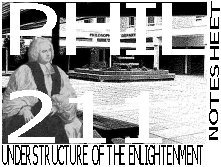 Hume 3
Hume 3 Hume 3
Hume 3'From the first appearance of an object, we never can conjecture what effect will result from it. But were the power or energy of any cause discoverable by the mind, we could foresee the effect, even without experience; and might, at first, pronounce with certainty concerning it, by mere dint of thought and reasoning.' Hume, Enquiry, Section VII Part 1.
One type of necessity only:
'It seems to me, that the only objects of the abstract science or of demonstration are quantity and number, and that all attempts to extend this more perfect species of knowledge beyond these bounds are mere sophistry and illusion. As the component parts of quantity and number are entirely similar, their relations become intricate and involved; and nothing can be more curious, as well as useful, than to trace, by a variety of mediums, their equality or inequality, through their different appearances. But as all other ideas are clearly distinct and different from each other, we can never advance farther, by our utmost scrutiny, than to observe this diversity, and, by an obvious reflection, pronounce one thing not to be another.' Hume, Enquiry, Section XII Part 3.
If this is one clear sense of necessity, Hume appears to be saying that the relation between two events is never necessary in that sense.
If it were, as he keeps saying, having the idea of one of the events would tell us what event must follow it.
Hume articulates a distinction between matters of fact and 'relations of ideas'.
' All the objects of human reason or enquiry may naturally be divided into two kinds, to wit, Relations of Ideas, and Matters of fact. Of the first kind are the sciences of Geometry, Algebra, and Arithmetic; and in short, every affirmation which is either intuitively or demonstarably certain ... propositions of this kind are discoverable by the mere operation of thought, without dependence on what is anywhere existent in the universe. ... Mattters of fact, which are the second object of human reason, are not ascertained in the same manner; nor is our evidence of their truth, however great, of a like nature with the foregoing. the contrary of every matter of fact is still possible; because it can never imply a contradiction ... That the sun will not rise tomorrow is no less intellgible a proposition and implies no more contardiction than the affirmation, that it will rise.' Hume, Treatise, Appendix B.
This exhaustive distinctive leads to Hume's seminal envoi:
'When we run over libraries, persuaded of these principles, what havoc must we make? If we take in our hand any volume; of divinity or school metaphysics, for instance; let us ask, Does it contain any abstract reasoning concerning quantity or number? No. Does it contain any experimental reasoning concerning matter of fact and existence? No. Commit it then to the flames: for it can contain nothing but sophistry and illusion.
Hume, Enquiry Concerning Human Understanding, XII, iii
For Locke the person was whatever it was that "had" the mental particles, or that "perceived" them:
" Self is that conscious thinking thing ... which is sensible or conscious of pleasure and pain, capable of happiness or misery ..." (John Locke)
Hume recognises the view of some philosophers that 'we are at ever moment intimately conscious of what we call our self. It is mistaken however. If there were such an idea, he says:
' [I]t must come from one impression, that gives rise to every real idea. But self or person is not any one impression, but that to which our several impressions and ideas are supposed to have a reference. If any impression gives ride to the idea of self, that impression must continue invariably the same, thro' the whole course of or lives; since self is suppos'd to exist after that manner. But there is no impression constant and invariable. pain and pleasure, grief and joy, passions and sensations succeed each other, and never all exist at the same time. It cannot, therefore, be from any of these impressions, or from any other, that the idea of self is deriv'd; and consequently there is no such idea.' Hume, Treatise, Book I, Section VI.
Hume's conception was thus that any positing of an entity which "entertained" or "experienced" mental particles had to be regarded in the final analysis as senseless. Instead, the only proper understanding of the self thinks Hume is that of the set of experiences themselves:
'When I enter most intimately into what I call myself, I also stumble on some particular perception or other ... I can never catch myself at any time without a perception ... If anyone upon serious and unprejudic'd reflection, thinks he has a different notion of himself, I must confess I can no longer reason with him. He may perhaps, perceive something simple and continu'd, which he calls himslef; tho' I am certain there is no such principle in me.' Hume Treatise Book I Section VI.
" They are the successive perceptions only, that constitute the mind ..." Hume A Treatise of Human Nature Book 1, Part IV, Section VI Everyman Edition (Ed Lindsay) p. 240.
This is the bundle conception of the self.
Possibly : Hume thought there were sets of ideas and impressions, but they were made into sets not by each member having a relationship in common with a further object, namely the self that perceived or entertained them, but by each having a link with one or more of the others. The ideas and impressions that "belonged to a single mind", he proposed, did so in virtue of being links in a single chain.
VP